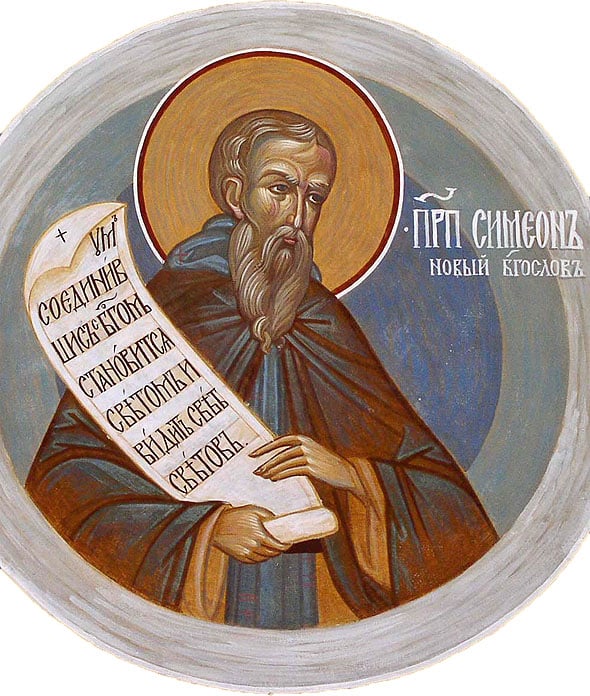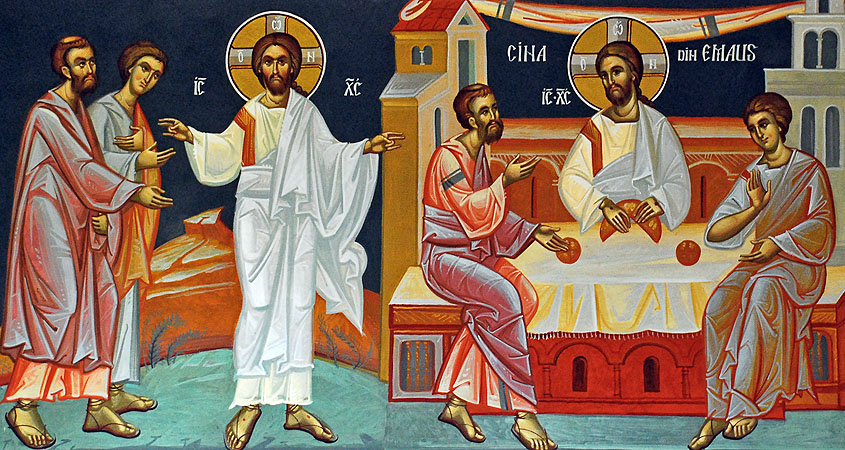How does Christ’s Resurrection take place within us?
21 April 2017Brethren and Fathers, Easter is now here, the festive day that brings us joy and gladness, the day of Christ’s Resurrection, which comes round once a year, or, to put it better, occurs daily and perpetually in those who know its mystery, filling our hearts with joy and inexpressible elation. At the same time, it marks the end of the efforts of the holy fast, or, better, has perfected our souls and has, at the same time, comforted them. So, as you see, it has summoned all the faithful to rest and thanksgiving.
Let us therefore give thanks to the Lord, Who has helped us chart the sea of the fast and has brought us, full of joy, to the haven of His Resurrection.

All of us who kept to the road of the fast willingly and strictly, full of fervor, and striving for the acquisition of the virtues, let us give thanks to Him, and let us do so even if we were less zealous than we should have been, through neglect and spiritual lassitude.
Because He it is Who grants, crowns to the zealous and rewards them commensurately to their efforts and, to those who are spiritually weaker, still awards forgiveness, given that He’s merciful and loves us. He gauges more the dispositions and intentions of our souls rather than the bodily labours with which we exercise ourselves in virtue, whether we engage in greater asceticism, with unstinting enthusiasm, or do less than the great strivers, because of the weakness of our bodies. According to our intentions, He shares the prizes and the gifts of the Spirit with each one of us, granting fame and glory to the most zealous, or leaving them on a lower level so that they have need of more diligent purification.
But, if you agree, let us examine carefully what the mystery of the Resurrection of Christ our God is, which, in us who so desire, is always celebrated mystically; and how Christ is buried within us, as in a tomb; and how, having become united with our souls, rises and raises us with Him. What I have in mind to say is this:
Christ our God was crucified and nailed to the Cross the sin of the world; he tasted death and descended into the lowest depths of hell. When He rose from Hell, He re-entered His spotless body (from which He had not been separated in His descent) and immediately arose from the dead and was later taken up into the heavens with great glory and power. In the same way as we have left the world of sin and, in imitation of the sufferings of the Lord, have entered the tomb of humility and repentance, so He, descending from the heavens, entered as it were into a tomb, our body and, having become united with our souls, resurrects them, though they were clearly dead. And then Christ permits those who have been raised with Him in this way to see His mystical resurrection.
Christ’s resurrection, then, is also the resurrection of us who live here below. It has been written that He never fell into sin, nor was the least part of His glory altered in any way, so how will He ever rise and be glorified, since He is forever glorified more than all else and is above all authority and power, remaining the same. As has been said, Christ’s resurrection and glory are ours, too, which, through His resurrection in us have occurred and are manifested in us and are seen by us. Having once and for all appropriated what is ours, He attributes to Himself the things He works in us. The resurrection of the soul is union with life. Unless the dead body receives the living soul in itself and is joined to it (though not mingled with it), it can’t live or be called alive.
In the same way, the soul can’t live unless it’s ineffably and without confusion united to God, Who is truly eternal life. Before this union in knowledge, vision and perception, it’s dead, albeit with an intellectual existence and an immortal nature. There’s no knowledge without vision and no vision without perception. What I mean is that there is vision, and, in the vision, knowledge and perception. I’m talking about spiritual matters here, since in the corporeal realm there is perception without vision. What do I mean? A blind person who stubs their toe on a stone feels it, but a dead person wouldn’t. In spiritual matters, unless the intellect attains to the vision of things beyond thought, it doesn’t perceive mystical activity.
Those who, before achieving contemplation in the spiritual realm, claim to perceive the things that are above intellect, word and meaning, are like someone who’s blind, who has a feeling for what’s good or bad, but isn’t aware that what’s in his hands or at his feet might be a matter of life or death for him. Since he’s deprived of the faculty of sight and perception, he has no way of knowing whether what’s coming to him is bad or good. So he’ll often raise his stick to defend himself against an enemy, yet, quite probably, strike a friend instead, while his enemy stands before him and laughs at him.
Most people believe in the Resurrection of Christ, but very few of them actually see it clearly. But if you haven’t seen it, you can’t worship Jesus Christ as the Holy One and the Lord. It’s said that: ‘No-one can say “Jesus is Lord” except in the Holy Spirit’, and elsewhere ‘God is Spirit and those who worship Him should do so in spirit and in truth’. That most holy formulation which is on our lips every day doesn’t say: ‘In that we’ve believed in the Resurrection of Christ’ but rather ‘In that we’ve beheld the Resurrection of Christ, let us worship the Lord Jesus, the only sinless One’.
How is it that the Holy Spirit encourages us to say ‘in that we’ve beheld the Resurrection of Christ’, as though we’d seen it, when, in fact, we haven’t? After all, Christ rose a thousand years ago and no-one saw it at the time. Surely the divine Scriptures don’t expect us to lie? Far from it. Rather they order us to tell the truth, which is that it, that is Christ’s resurrection, occurs in each and every one of us believers, not once and for all but every hour of the day, in a manner of speaking, when Christ the Lord has risen in us, effulgent and radiating the lightning shafts of incorruption and the Deity. The light-bearing presence of the Spirit shows us, like the dawn, or rather allows us to see the Resurrection of the Lord. This is why we say ‘God is the Lord and has appeared to us’ [The Greek could also mean ‘and has shone upon us’].
And we refer to His Second Coming in these terms: ‘Blessed is He Who is coming in the name of the Lord’. To those to whom the Risen Christ has appeared, entirely in the Sprit, He has shown Himself to their spiritual eyes. When this happens to us in the Spirit, He raises us and quickens us, and allows us to see Him all alive in us, immortal and indestructible as He is. Moreover, he clearly permits us to know Him Who raises us up with Him and with Whom we are glorified, as all the Holy Scriptures testify.
These, then are the divine mysteries of the Christians, the hidden power of our faith, which the unbelievers, the sceptics and the partial believers neither see nor are able to see. The unbelievers, sceptics and partial believers are those who don’t demonstrate their faith through works. Because even the demons believe and confess that Christ is God and the Lord, though they have no works. ‘We know you’, they say, ‘the Son of God’, and elsewhere ‘These people are servants of God the Most High’. But this faith is of no benefit to them, because, according to the divine Apostle [James 2, 26], ‘Faith without works is dead’, just as deeds are without faith. How is it dead?
Because, within it, it doesn’t have the life-giving God, it hasn’t laid hold on Him Who said: ‘He who loves me will keep my commandments and the Father and I will come and dwell in him’. So that He may, by His presence, raise from the dead those who have acquired faith and quicken them, and allow them to see Him Who has risen in them and has raised them up. This is why such faith is dead, are rather they’re dead who have it but have nothing to show for it. Faith in God is always alive and, living as it does, gives life to those who approach it with pure intentions and receive it. It brought many people from death to life and showed them Christ and God, even before they started performing His commandments.
Had they but persevered in the observation of His commandments and kept them till they died, they too, would have been preserved by them, that is, in the condition into which faith alone had brought them. But since they turned aside like a crooked bow and pierced themselves upon their earlier actions, they obviously wrecked the ship of their faith and, unfortunately, deprived themselves of the true riches, Christ our God. Therefore I would urge you, let us keep God’s commandments with all our strength, so that we don’t share their fate but enjoy both the present and future blessings, that is, the actual vision of Christ. May we all attain to this, through the grace of Our Lord, Jesus Christ, to Whom be glory unto the ages. Amen.







